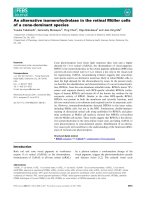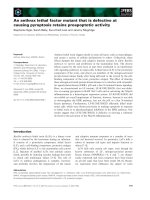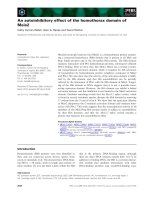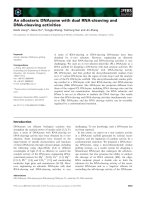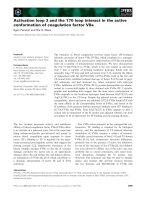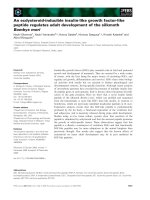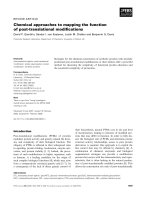Tài liệu Báo cáo khoa học: "An API for Measuring the Relatedness of Words in Wikipedia" docx
Bạn đang xem bản rút gọn của tài liệu. Xem và tải ngay bản đầy đủ của tài liệu tại đây (354.65 KB, 4 trang )
Proceedings of the ACL 2007 Demo and Poster Sessions, pages 49–52,
Prague, June 2007.
c
2007 Association for Computational Linguistics
An API for Measuring the Relatedness of Words in Wikipedia
Simone Paolo Ponzetto and Michael Strube
EML Research gGmbH
Schloss-Wolfsbrunnenweg 33
69118 Heidelberg, Germany
/>Abstract
We present an API for computing the seman-
tic relatedness of words in Wikipedia.
1 Introduction
The last years have seen a large amount of work in
Natural Language Processing (NLP) using measures
of semantic similarity and relatedness. We believe
that the extensive usage of such measures derives
also from the availability of robust and freely avail-
able software that allows to compute them (Pedersen
et al., 2004, WordNet::Similarity).
In Ponzetto & Strube (2006) and Strube &
Ponzetto (2006) we proposed to take the Wikipedia
categorization system as a semantic network which
served as basis for computing the semantic related-
ness of words. In the following we present the API
we used in our previous work, hoping that it will en-
courage further research in NLP using Wikipedia
1
.
2 Measures of Semantic Relatedness
Approaches to measuring semantic relatedness that
use lexical resources transform these resources into
a network or graph and compute relatedness using
paths in it (see Budanitsky & Hirst (2006) for an ex-
tensive review). For instance, Rada et al. (1989)
traverse MeSH, a term hierarchy for indexing ar-
ticles in Medline, and compute semantic related-
ness straightforwardly in terms of the number of
edges between terms in the hierarchy. Jarmasz &
Szpakowicz (2003) use the same approach with Ro-
get’s Thesaurus while Hirst & St-Onge (1998) apply
a similar strategy to WordNet.
1
The software can be freely downloaded at http://www.
eml-research.de/nlp/download/wikipediasimilarity.php.
3 The Application Programming Interface
The API computes semantic relatedness by:
1. taking a pair of words as input;
2. retrieving the Wikipedia articles they refer to
(via a disambiguation strategy based on the link
structure of the articles);
3. computing paths in the Wikipedia categoriza-
tion graph between the categories the articles are
assigned to;
4. returning as output the set of paths found,
scored according to some measure definition.
The implementation includes path-length (Rada
et al., 1989; Wu & Palmer, 1994; Leacock &
Chodorow, 1998), information-content (Resnik,
1995; Seco et al., 2004) and text-overlap (Lesk,
1986; Banerjee & Pedersen, 2003) measures, as de-
scribed in Strube & Ponzetto (2006).
The API is built on top of several modules and can
be used for tasks other than Wikipedia-based relat-
edness computation. On a basic usage level, itcan be
used to retrieve Wikipedia articles by name, option-
ally using disambiguation patterns, as well as to find
a ranked set of articles satisfying a search query (via
integration with the Lucene
2
text search engine).
Additionally, it provides functionality for visualiz-
ing the computed paths along the Wikipedia cate-
gorization graph as either Java Swing components
or applets (see Figure 1), based on the JGraph li-
brary
3
, and methods for computing centrality scores
of the Wikipedia categories using the PageRank al-
gorithm (Brin & Page, 1998). Finally, it currently
2
3
49
Figure 1: Shortest path between computer and key-
board in the English Wikipedia.
provides multilingual support for the English, Ger-
man, French and Italian Wikipedias and can be eas-
ily extended to other languages
4
.
4 Software Architecture
Wikipedia is freely available for download, and can
be accessed using robust Open Source applications,
e.g. the MediaWiki software
5
, integrated within a
Linux, Apache, MySQL and PHP (LAMP) software
bundle. The architecture of the API consists of the
following modules:
1. RDBMS: at the lowest level, the encyclopedia
content is stored in a relational database manage-
ment system (e.g. MySQL).
2. MediaWiki: a suite of PHP routines for interact-
ing with the RDBMS.
3. WWW-Wikipedia Perl library
6
: responsible for
4
In contrast to WordNet::Similarity, which due to the struc-
tural variations between the respective wordnets was reimple-
mented for German by Gurevych & Niederlich (2005).
5
6
/>querying MediaWiki, parsing and structuring the
returned encyclopedia pages.
4. XML-RPC server: an inter mediate communica-
tion layer between Java and the Perl routines.
5. Java wrapper library: provides a simple inter-
face to create and access the encyclopedia page
objects and compute the relatedness scores.
The information flow of the API is summarized by
the sequence diagram in Figure 2. The higher in-
put/output layer the user interacts with is provided
by a Java API from which Wikipedia can be queried.
The Java library is responsible for issuing HTTP re-
quests to an XML-RPC daemon which provides a
layer for calling Perl routines from the Java API.
Perl routines take care of the bulk of querying ency-
clopedia entries to the MediaWiki software (which
in turn queries the database) and efficiently parsing
the text responses into structured objects.
5 Using the API
The API provides factory classes for querying
Wikipedia, in order to retrieve encyclopedia entries
as well as relatedness scores for word pairs. In
practice, the Java library provides a simple pro-
grammatic interface. Users can accordingly ac-
cess the library using only a few methods given
in the factory classes, e.g. getPage(word)
for retrieving Wikipedia articles titled word or
getRelatedness(word1,word2), for com-
puting the relatedness between word1 and word2,
and display(path) for displaying a path found
between two Wikipedia articles in the categorization
graph. Examples of programmatic usage of the API
are presented in Figure 3. In addition, the software
distribution includes UNIX shell scripts to access
the API interactively from a terminal, i.e. it does not
require any knowledge of Java.
6 Application scenarios
Semantic relatedness measures have proven use-
ful in many NLP applications such as word sense
disambiguation (Kohomban & Lee, 2005; Patward-
han et al., 2005), information retrieval (Finkelstein
et al., 2002), information extraction pattern induc-
tion (Stevenson & Greenwood, 2005), interpretation
of noun compounds (Kim & Baldwin, 2005), para-
50
Figure 2: API processing sequence diagram. Wikipedia pages and relatedness measures are accessed
through a Java API. The wrapper communicates with a Perl library designed for Wikipedia access and pars-
ing through an XML-RPC server. WWW-Wikipedia in turn accesses the database where the encyclopedia
is stored by means of appropriate queries to MediaWiki.
51
// 1. Get the English Wikipedia page titled "King" using "chess" as disambiguation
WikipediaPage page = WikipediaPageFactory.getInstance().getWikipediaPage("King","chess");
// 2. Get the German Wikipedia page titled "Ufer" using "Kueste" as disambiguation
WikipediaPage page = WikipediaPageFactory.getInstance().getWikipediaPage("Ufer","Kueste",Language.DE);
// 3a. Get the Wikipedia-based path-length relatedness measure between "computer" and "keyboard"
WikiRelatedness relatedness = WikiRelatednessFactory.getInstance().getWikiRelatedness("computer","keyboard");
double shortestPathMeasure = relatedness.getShortestPathMeasure();
// 3b. Display the shortest path
WikiPathDisplayer.getInstance().display(relatedness.getShortestPath());
// 4. Score the importance of the categories in the English Wikipedia using PageRank
WikiCategoryGraph<DefaultScorableGraph<DefaultEdge>> categoryTree =
WikiCategoryGraphFactory.getCategoryGraphForLanguage(Language.EN);
categoryTree.getCategoryGraph().score(new PageRank());
Figure 3: Java API sample usage.
phrase detection (Mihalcea et al., 2006) and spelling
correction (Budanitsky & Hirst, 2006). Our API
provides a flexible tool to include such measures
into existing NLP systems while using Wikipedia
as a knowledge source. Programmatic access to the
encyclopedia makes also available in a straightfor-
ward manner the large amount of structured text in
Wikipedia (e.g. for building a language model), as
well as its rich internal link structure (e.g. the links
between articles provide phrase clusters to be used
for query expansion scenarios).
Acknowledgements: This work has been f unded
by the Klaus Tschira Foundation, Heidelberg, Ger-
many. The first author has been supported by a KTF
grant (09.003.2004). We thank our colleagues Katja
Filippova and Christoph M
¨
uller for helpful feed-
back.
References
Banerjee, S. & T. Pedersen (2003). Extended gloss overlap as
a measure of semantic relatedness. In Proc. of IJCAI-03, pp.
805–810.
Brin, S. & L. Page (1998). The anatomy of a large-scale hyper-
textual web search engine. Computer Networks and ISDN
Systems, 30(1–7):107–117.
Budanitsky, A. & G. Hirst (2006). Evaluating WordNet-based
measures of semantic distance. Computational Linguistics,
32(1).
Finkelstein, L., E. Gabrilovich, Y. Matias, E. Rivlin, Z. Solan,
G. Wolfman & E. Ruppin (2002). Placing search in context:
The concept revisited. ACM Transactions on Information
Systems, 20(1):116–131.
Gurevych, I. & H. Niederlich (2005). Accessing GermaNet data
and computing semantic relatedness. In Comp. Vol. to Proc.
of ACL-05, pp. 5–8.
Hirst, G. & D. St-Onge (1998). Lexical chains as repre-
sentations of context for the detection and correction of
malapropisms. In C. Fellbaum (Ed.), WordNet: An Elec-
tronic Lexical Database, pp. 305–332. Cambridge, Mass.:
MIT Press.
Jarmasz, M. & S. Szpakowicz (2003). Roget’s Thesaurus and
semantic similarity. In Proc. of RANLP-03, pp. 212–219.
Kim, S. N. & T. Baldwin (2005). Automatic interpretation
of noun compounds using WordNet similarity. In Proc. of
IJCNLP-05, pp. 945–956.
Kohomban, U. S. & W. S. Lee (2005). Learning semantic
classes for word sense disambiguation. In Proc. of ACL-05,
pp. 34–41.
Leacock, C. & M. Chodorow (1998). Combining local con-
text and WordNet similarity for word sense identifica-
tion. In C. Fellbaum (Ed.), WordNet. An Electronic Lexical
Database, Chp. 11, pp. 265–283. Cambridge, Mass.: MIT
Press.
Lesk, M. (1986). Automatic sense disambiguation using ma-
chine readable dictionaries: How to tell a pine cone from an
ice cream cone. In Proceedings of the 5th Annual Confer-
ence on Systems Documentation, Toronto, Ontario, Canada,
pp. 24–26.
Mihalcea, R., C. Corley & C. Strapparava (2006). Corpus-based
and knowledge-based measures of text semantic similarity.
In Proc. of AAAI-06, pp. 775–780.
Patwardhan, S., S. Banerjee & T. Pedersen (2005). SenseRe-
late::TargetWord – A generalized framework for word sense
disambiguation. In Proc. of AAAI-05.
Pedersen, T., S. Patwardhan & J. Michelizzi (2004). Word-
Net::Similarity – Measuring the relatedness of concepts. In
Comp. Vol. to Proc. of HLT-NAACL-04, pp. 267–270.
Ponzetto, S. P. & M. Strube (2006). Exploiting semantic role
labeling, WordNet and Wikipediafor coreference resolution.
In Proc. of HLT-NAACL-06, pp. 192–199.
Rada, R., H. Mili, E. Bicknell & M. Blettner (1989). Devel-
opment and application of a metric to semantic nets. IEEE
Transactions on Systems, Man and Cybernetics, 19(1):17–
30.
Resnik, P. (1995). Using information content to evaluate seman-
tic similarity in a taxonomy. In Proc. of IJCAI-95, Vol. 1, pp.
448–453.
Seco, N., T. Veale & J. Hayes (2004). An intrinsic information
content metric for semantic similarity in WordNet. In Proc.
of ECAI-04, pp. 1089–1090.
Stevenson, M. & M. Greenwood (2005). A semantic approach
to IE pattern induction. In Proc. of ACL-05, pp. 379–386.
Strube, M. & S. P. Ponzetto (2006). WikiRelate! Computing
semantic relatedness us ing Wikipedia. In Proc. of AAAI-06,
pp. 1419–1424.
Wu, Z. & M. Palmer (1994). Verb semantics and lexical selec-
tion. In Proc. of ACL-94, pp. 133–138.
52
